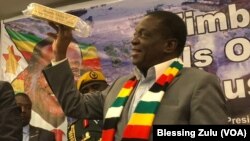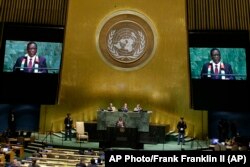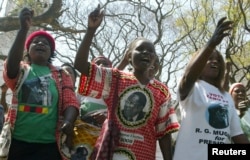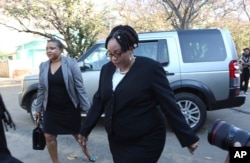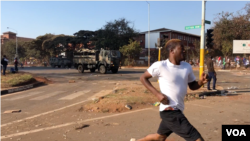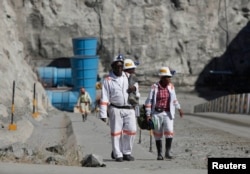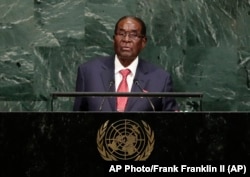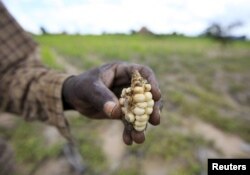“It is my honour and pleasure to deliver my maiden statement in this august Assembly.” Those were the first remarks from Zimbabwean President Emmerson Mnangagwa in New York Wednesday at the United Nations Head Headquarters.
Zimbabwe had waited for nearly four decades to have someone other than former ruler Robert Mugabe take to the podium at the United Nations General Assembly to represent the nation. But analysts say in terms of content, Mnangagwa stuck to the same old script with cosmetic changes when he delivered his maiden speech, minus Mr. Mugabe’s trademark attacks on the West.
Analysts say under Mr. Mnangagwa, Zimbabwe’s foreign policy has not changed. He talked about sanctions, land reform, United Nations Reforms and climate change. But unlike his predecessor, he invited developed nations to come and invest in his country, whose foreign direct investment has been in decline since 2014.
Mr. Mnangagwa said despite challenges posed by targeted sanctions imposed on Harare by Washington and the European Union, he had managed to stabilize the food situation.
“I am pleased to report that Zimbabwe has made substantial progress in the implementation of some of the Sustainable Development Goals (SDGs), in particular with regards to ensuring food security.”
He added that “through our people-centered policies and planned programmes, complemented by private sector financing and investments; farmers receive inputs, equipment and technical support. In a bid to improve nutrition and broaden income opportunities, we have also extended support to grow the livestock, fisheries and wildlife sectors. We are confident that these multi-pronged programmes will accelerate Zimbabwe’s re-entry into the global economy and associated value chains. This is one example of innovation, creativity and home grown solutions in addressing key developmental and economic challenges in spite of the continued illegal sanctions imposed on our country. We call for their immediate and unconditional removal.”
In 2001, the United States began imposing restrictions on U.S. support for multilateral financing, followed by financial sanctions against selected Zimbabwean individuals and entities, travel sanctions against selected individuals, a ban on transfers of defense items and services, and a suspension of non-humanitarian government-to-government assistance. Despite strained political relations, the United States is the largest provider of development and humanitarian assistance to the people of Zimbabwe.
Mr. Mnangagwa though took a dig at developed nations for allegedly using force in resolving world problems. “Now more than ever before, the United Nations must stamp its authority and work harder for peace in a world where might is increasingly being regarded as right.”
President Mnangagwa also reiterated that his country’s land reform programme was irrevocable. “The land reform programme is behind us and is irreversible.”
The Zimbabwean leader told the international community that the election held two months ago was a success because of his call for peace. ‘’In view of the fact that elections as an integral element of democracy, my country held the much anticipated harmonised general elections on the 30th July 2018.”
The President further said, “Following my deliberate and conscious decision to open up the democratic space and emphatic call for peace, unity and tolerance of divergent views amongst our people; political contestations, election campaigning, voting and counting processes were conducted freely, peacefully and transparently. In the spirit of transparency and openness, a broader spectrum of international observers and global media houses were accredited to observe our elections.
“The exceptionally peaceful pre and post electoral environment represented the maturing and entrenchment of democracy in Zimbabwe. We are grateful to the UN and other Member States for sending Election Observer Missions and for the Technical Assistance received by our Election Management Body. The recommendations will be taken into account as we deepen our democratic and electoral processes. We shall continue to entrench constitutionalism democratic traditions and norms, peace unity and harmony; for it is indeed under such conditions that sustainable development, inclusive economic growth and prosperity can occur.”
Mr. Mnangagwa also promised to investigate post-election violence that saw the military gunning down six people in central Harare.
“The isolated and unfortunate incident of the post-election violence that occurred on 1 August 2018 is regrettable and most unacceptable,” he said, adding that “the Commission of Inquiry comprising eminent persons of national, regional and international repute has now begun its work in earnest. Their ultimate report and recommendations shall help us bring closure to the matter and assist in the improvement of our institutional governance.”
Mr. Mnangagwa like many African, Middle East, Asian and Latin American countries called for the reform of the United Nations. “The United Nations and its organs require to be democratized. We join the call for Africa to be represented in the permanent category and to have increased representation in the non-permanent category. This position is indeed justified, in view of the need to correct the historical injustice which has left the African continent on the periphery of all major global decision making processes.”
The president also declared that Zimbabwe is open for business and has an ambitious plan of turning around the economy. “Emboldened by the dreams, hopes and aspirations of our people, and in tandem with the United Nations Agenda 2030 and the African Union Agenda 2063, we have outlined our vision to become a middle income economy with a per capita income of about USD3 500.
“This will bring on board increased investment, decent jobs, broad based empowerment and a society free from poverty and corruption by 2030. Zimbabwe is open for business and we are presently undertaking a raft of economic and political reforms to ensure an environment that facilitates inclusive and sustained economic growth. We have put in place institutions and instruments that maximize land utilization and increase agriculture productivity. Equally, strategies are in place in the various sectors of our economy, to enable my country to enter the global value chains. The development and modernization of our roads, railways, airports, energy and ICT infrastructure is being accelerated in line with our regional and continental quest for enhanced connectivity and integrated infrastructure.”
Mr. Mnangagwa stuck to Zimbabwe’s foreign policy of supporting Palestine and the Western Saharawi.
ZIMBABWEANS REACT TO ED MAIDEN SPEECH
Reacting to Mnangagwa’s UN General Assembly speech, the editor of the Zimbabwe Independent newspaper, Dumisani Muleya, said, “Mnangagwa’s speech exuded a positive narrative and it was very refreshing, well, especially compared to Mugabe’s routinely stale and belligerent speeches which the UN has to endure for years during his reign in Zimbabwe.” Muleya though added, “However, beyond that it had no groundbreaking substance and was rather pedestrian. Nothing innovative or interesting, run-of-the-mill issues made all the more tedious by an uncreative and poor delivery.”
Political analyst, Farai Maguwu, said nothing much has changed from the Mugabe foreign policy. “I think he repeated almost everything Mugabe would have said, but in a different tone.
“Where Mugabe would take no prisoners in his direct attacks on western leaders, ED (Emmerson Mnangagwa) spoke diplomatically and gently and spent much of his time on progressive ideas such as peace, unity and development. I would say he only mentioned in passing controversial issues such as land and sanctions, reminding the UN that there is continuity on government views on these issues, but he didn’t want these to override his overall goal - an appeal for acceptance by world leaders and attracting investments.”
US based political analyst, Doctor Chipo Dendere, took issue with Mr. Mnangagwa’s claim of food security.
“The speech was what one would have expected … He used key words like open for business and free and fair election. However, telling the world that Zimbabwe has food security when just last month we saw a report on food insecurity was a stretch. Of all the SDGs why go with that one which is completely untrue? He could have said we are working towards universal education and no one would question that. But food security? … Actually sets them up for failure because we will need food inputs soon.”
A recent report from Famine Early Warning System (FEWSNET), a leading provider of early warning and analysis on food insecurity, noted recently that in Zimbabwe “an increasing number of poor households in deficit-producing areas in the south, west, and extreme north have depleted their food stocks in August and are in Crisis.”
The World Food Programme has projected that more than 2.4 million rural Zimbabweans will likely face critical hunger and be food insecure during the lean season from January through March due to an expected El Niño.
Czech University of Life Sciences political analyst, Welcome Zimuto, was unhappy with the president’s Commission into the fatal shooting of civilians by the army. “It’s worrying though that he does not mention that there will be action rather he says we will have recommendations then maybe.”
Zimuto also said, “The belief that elections are behind and Zimbabweans should focus on development while most if not all a western powerhouses have reiterated the need for a democratic electoral process as the bedrock of engagement - no difference with Mugabe regime.”
Zimuto criticized Mnangagwa’s remarks on targeted sanctions. “In fact he echoes Mugabe’s yesteryear call for removal of sanctions without mentioning or outlining steps to be taken by his government to make sure human rights, property rights and protection of fundamental rights. In short there is no political will to change the governance culture, it’s just a smokescreen speech trying to put a new face when in actual fact they are the real Mugabe’s in government.”




